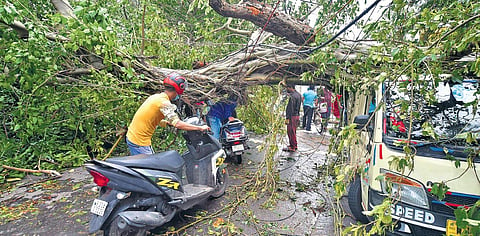

KOLKATA: The deadly super cyclone Amphan that hit West Bengal and Odisha on May 20 and claimed over 80 lives has virtually cut Kolkatans off the grid since Wednesday evening.
Along with a trail of destruction, the storm also left the city without electricity for nearly 12-13 hours causing massive outages. All forms of communication including cellular networks and broadband took a beating too.
The impact was far-reaching. As many people are working from home amid the escalating coronavirus outbreak that has gripped the country with over 1,18,000 cases, they are heavily reliant on broadband services to let their productivity shine. But the cyclone put paid to all that.
People with offices based either in Kolkata or other cities have been facing many issues trying to reconnect with coworkers and keep the workflow going.
“The network had completely gone since the storm until yesterday evening for all service providers. Since the softwares that we use are quite heavy, I couldn’t really work at all yesterday and it’s weak today too,” says Sonal Singh, 28, an Application Development Senior Analyst with an IT firm in Gurugram.
Sonal, who has been working from Kolkata from the past two months due to the nationwide COVID-19 lockdown, says work has virtually come to a standstill as all she has for connectivity at the moment is her mobile hotspot connected to Jio and even that is rendering “intermittent services”.
Abhinav Singh, 22, an analyst with an MNC in Gurugram, who has also been working from home in Kolkata, is dependent on the same network since others including Vodafone and Airtel have been unable to restore services from Wednesday. As a result, many failed to reach out to their loved ones.
With at least 5,000 trees uprooted and power lines being tangled up, fears of electrocution as well as sheer inaccessibility have hindered efforts to resume normalcy and resulted in perhaps the greatest communication breakdown the city has seen in recent times.
Work too has naturally taken a hit.
“My teammates have been kind enough to work on urgent issues in my absence. Work had to be delegated to my colleague. I didn’t want him to be overburdened. But I am a little helpless here,” she says.
While her immediate team, she says, had been understanding, most others were clueless about the gravity of the situation due to lack of appropriate network coverage.
Sabyasachi Sen, 25, a decision analyst with a multinational bank in Kolkata, says his colleagues have been able to redistribute work in the wake of the calamity. That, however, couldn’t undo the damage as work flow inevitably slowed down.
Sabyasachi is pinning his hopes on the restoration work showing effect in three or four days. Until then, he says, “We are figuring out the optimal way to do work requiring less network bandwidth. We are also getting constant updates from IT and management about the dos and don’ts.”
That aside, the mental agony of residents continues, with many still having no water supply or electricity. But despite the massive devastation, people have shown resilience to get back to work, doing whatever they can, says Sabyasachi -- a spirit that should help Kolkata get back on its feet sooner rather than later.